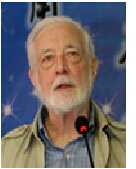 |
讲座名称:Supervisory Control of Discrete-event Systems
讲座时间:下午14:00~16:004月
13日(周一)、4月15日(周三)、4月17日(周五)、 4月20日(周一)、4月22日(周三)
4月24日(周五)、 4月27日(周一)、4月28日(周二)、4月29日(周三)、 5月4 日(周一)
5月6日(周三)、 5月7日(周四)
讲座地点:北校区主楼Ⅲ-327会议室 |
讲 座 人: Prof. W.M.Wonham
讲座人介绍:
W.M.Wonham教授是离散事件系统监督控制理论的创始人。于1956年在加拿大麦吉尔大学(McGill University)获工程物理学学士学位,1961年在英国剑桥大学(University of Cambridge)应用数学系获控制工程博士学位,1961年至1969年间他先后受聘于美国普渡大学(Purdue University),马丁-马利埃塔公司(Martin-Marietta),布朗大学(Brown University)和美国宇航局(NASA)电子学研究中心等单位;1970年至今在加拿大多伦多大学电气与计算机工程系工作。他是加拿大皇家学会院士、IEEE终身院士、美国工程院外籍院士;1987年被IEEE授予控制系统科学和工程学奖;1990年荣获荷兰数学学会布劳威尔奖;1996年他被多伦多大学任命为University Professor。他的主要研究方向包括:随机控制与滤波、几何多变量控制以及离散事件系统;著有《基于几何学的线性多变量控制》和《状态树结构的递阶控制》。他自1985年至今发表论文80多篇,被SCI他引6000多次,被誉为二十世纪下半叶三位最杰出的自动控制专家之一。
讲座内容:
The control of discrete-event systems (DES) is a research area of current vitality, stimulated by the hope of discovering general principles common to a wide range of application domains. Among the latter are manufacturing systems, traffic systems, database management systems, communication protocols, and logistic (service) systems. The contributing specialties are notably control, computer and communication science and engineering, together with industrial engineering and operations research. The course is devoted to a simple, abstract model of controlled DES that has proved to be tractable, appealing to control specialists, and expressive of a range of control-theoretic ideas, including the synthesis of controlled dynamic invariants by state feedback, and the resolution of such problems in terms of naturally definable control-theoretic concepts and properties, like reachability, controllability and observability. The idea is to construct this controller so that the events it currently disables depend in a suitable way on the past behavior of the generating DES.
参考教材:
[1] Wonham W M. Supervisory control of discrete event systems[J], 2006.
[2] Balemi, S., P. Kozak, R. Smedinga (Eds.). Discrete Event Systems: Modeling and Control. Birkhaüser
[3] Hopcroft J E. Introduction to Automata Theory, Languages, and Computation, 3/E[M]. Pearson Education India, 2008.
[4] Rosen K H, Krithivasan K. Discrete mathematics and its applications[M].New York: McGraw-Hill,1999.


